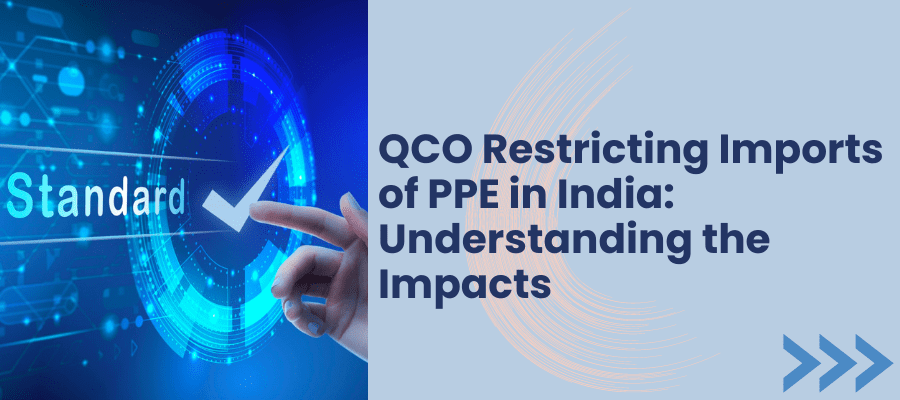QCO Restricting Imports of PPE in India: Understanding the Impacts
 September 04, 2024
8741
September 04, 2024
8741

In recent years, India’s approach to regulate the quality of imported goods has undergone significant changes, particularly with the introduction of the Quality Control Order (QCO). This regulatory mechanism aims to ensure that only products conforming to specific product quality standards are allowed to be sold in India. QCO has had a profound impact on various industries, including the imports of PPE. We will delve into the QCO’s significance, its implications for the PPE industry, and the challenges and opportunities it presents.
What is QCO?
The Quality Control Order (QCO) is a regulatory tool employed by the Bureau of Indian Standards (BIS) to enforce specific quality standards on products, including PPE products. Under the QCO, certain products must conform to Indian standards (ISI) and obtain the BIS certification before they can be sold in the Indian market. This applies to both domestically manufactured and imported goods, making it a crucial element in safeguarding consumer safety and promoting quality assurance.
Rationale Behind the QCO
The BIS certification scheme is basically voluntary in nature. However, for several products compliance to Indian Standards is made compulsory by the Central Government under various considerations viz. public interest, protection of human, animal or plant health, safety of environment, prevention of unfair trade practices, and national security. For such products, the Central Government directs mandatory use of Standard Mark under a Licence or Certificate of Conformity (CoC) from BIS through the issuance of QCOs.
Implications for the PPE Industry
The QCO’s have far-reaching implications for the PPE industry in India. The government has made it mandatory for more than 600+ products to have compulsory ISI marks. The complete list can be found in the link https://www.bis.gov.in/product-certification/products-under-compulsory-certification/scheme-i-mark-scheme/
Manufacturers in India & Importers now face the challenge of ensuring that the products meet the specified BIS standards. This often requires most companies to have testing, certification, and compliance procedures in place.
However, these regulations also present an opportunity for the domestic industry to strengthen its position. By raising the quality bar, the QCO encourages manufacturers to improve their product offerings, ultimately leading to enhanced consumer trust. Additionally, the QCO can catalyze innovation, as companies invest in research and development to meet the stringent requirements.

Alignment with the “Make in India” Campaign
The QCO’s emphasis on quality standards aligns closely with Prime Minister Narendra Modi’s “Make in India” campaign, which aims to boost domestic manufacturing and reduce dependence on imports. By ensuring implementation of ISI for both domestic and imported products, the QCO indirectly supports the growth of Indian manufacturers who are already compliant with BIS regulations. The campaign’s focus on creating a robust manufacturing sector dovetails with the QCO’s objective of promoting high-quality, locally-manufactured PPE. This synergy not only encourages investment in the domestic manufacturing companies but also positions India as a global leader in the production of top-tier protective equipment.
Opportunities for Domestic Manufacturers
On the flip side, the QCO presents a golden opportunity for domestic manufacturers of PPE. As importers grapple with the challenges of compliance, local producers who already adhere to BIS standards may find themselves in a more competitive position. The QCO encourages domestic innovation and could lead to increased market share for Indian manufacturers, as consumers increasingly rely on locally produced products.
Conclusion
The QCO restriction for imports of products that don’t meet ISI standards marks a significant step towards enhancing product quality and consumer safety. While it poses challenges for importers, particularly in terms of compliance and costs, it also creates opportunities for domestic manufacturers to thrive. As India continues to emphasize quality assurance, the PPE industry is likely to see further advancements, ultimately benefiting both consumers and the industry as a whole.
By ensuring that only high-quality products enter the market, the QCO plays a crucial role in safeguarding the well-being of Indian consumers and promoting a culture of safety and excellence.


